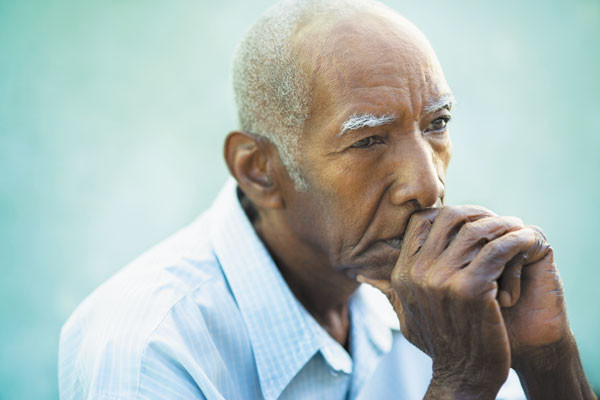
What are somatic workouts?

How to curb your stress eating

How to spot Parkinson’s disease symptoms

8 simple ways to reduce ultra-processed foods in your diet

Heart failure symptoms in women: How they’re different

GERD diet: Foods to avoid to reduce acid reflux

Strong is the new skinny

Everyday habits that sneakily weaken your bones

Don’t wait to get help for back pain

Correcting how you walk may ease osteoarthritis knee pain
Mind & Mood Archive
Articles
Is an underlying condition causing your fuzzy thinking?
The top five causes you may be overlooking.
Image: the-lightwriter/iStock
You know the feeling: you can't find a particular word, remember someone's name, or concentrate the way you once did. Is it just aging, or is something else to blame? "It's easy to underestimate how underlying conditions affect memory and thinking, and they are often overlooked," says Dr. Shreya Raj, a neuropsychiatrist with the Center for Brain/Mind Medicine at Harvard-affiliated Brigham and Women's Hospital.
Common causes
What you should do
When trouble with concentration or memory interferes with your day, it's probably time to talk to your primary care doctor. Report any additional symptoms you may be having, such as fatigue, muscle weakness, sadness, daytime sleepiness, or anxiety. You might need some blood tests to check your thyroid hormones or B12 levels (neither test is ordered routinely), or a sleep test if you have sleep apnea symptoms.
Often, treating an underlying condition can restore your clarity of thinking. "When we treat depression or sleep apnea, for example, we see a sudden improvement in memory and focus," says Dr. Raj. "And if a medication side effect is the problem, changing the dose or type of drug may resolve the problem."
If treating an underlying condition doesn't sharpen thinking skills, your doctor may refer you to a neuropsychologist for formal tests of your thinking ability, particularly signs of dementia. Most of the time, however, people with fuzzy thinking do not have dementia.
Fuzz bustersWhen you're struggling with fuzzy thinking, lifestyle changes like these can bring more clarity. Get more sleep. Aim for seven to eight hours of sleep per night. "Older adults to tend to sleep less, but if you're getting too little sleep, you won't think as sharply as you could," says Dr. Shreya Raj. Boost your Z's by going to sleep and waking at the same time each day, and avoiding caffeine, particularly after noon. Exercise more. Try to get 150 minutes of moderate-intensity activity per week, such as brisk walking. You'll get more sleep and boost blood flow to the brain. Many studies have shown that aerobic exercise in particular improves thinking skills. Change your diet. "Not eating healthfully makes you more sluggish, even in thinking. Studies have shown the Mediterranean diet may improve cognitive function," says Dr. Raj. The diet includes fresh vegetables and fruits; whole grains; olive oil; nuts; legumes; fish; moderate amounts of poultry, eggs, and dairy; moderate amounts of red wine; and red meat only sparingly. Image: JackF/Thinkstock |
Loneliness and isolation raise risk for stroke and heart disease, study suggests
Loneliness and isolation are associated with an increased risk for developing coronary artery disease (CAD) and stroke.
What a therapist can do for you
Many men resist talking about their problems, but there are times when it's necessary.
Image: ArtemSam/Thinkstock
Men often like to think of themselves as the strong, problem-solver type who never needs help, especially when it comes to their emotional and mental issues. But men should never bottle up their feelings and tough it out, according to Dr. Darshan Mehta, medical director of the Benson-Henry Institute for Mind Body Medicine at Harvard-affiliated Massachusetts General Hospital.
"Your mental health is equally as important as your physical health and proper nutrition. Not addressing negative feelings can carry over to all aspects of your life and have a profound impact," he says.
How to stay motivated
Want to make a change but wondering how to stay motivated? Dr. Srini Pillay talks about the things that can impact personal motivation and the power of a sense of meaning to help you stick with your goals.
Tips for getting more energy
If you find yourself in a slump, Dr. Beth Frates shares what may be draining you and offers tips for getting more energy.
How to keep your brain healthy through exercise
Exercise helps keep the brain healthy by improving memory and problem solving, and may even reduce the risk of dementia. Dr. Alvaro Pascual-Leone advocates regular exercise as a treatment for all people and explains more about the benefits for the brain.
Back to school
Taking a class to explore a subject or learn a new skill may increase cognitive ability and slow mental aging.
Image: Monkey Business Images/Thinkstock
Active aging involves more than moving your body. You also need to move your brain. "When you exercise, you engage your muscles to help improve overall health," says Dr. Ipsit Vahia, director of geriatric outpatient services for Harvard-affiliated McLean Hospital. "The same concept applies to the brain. You need to exercise it with new challenges to keep it healthy."
A fun way to do this is to sharpen your No. 2 pencils and go back to school. "New brain cell growth can happen even late into adulthood," says Dr. Vahia. "The process of learning and acquiring new information and experiences, like through structured classes, can stimulate that process."
Study shows mind-body approaches better than pain relievers for sore backs
Research We’re Watching
Cognitive behavioral therapy has been shown to be effective in treating chronic back pain, but it requires regular visits with a psychotherapist and can be expensive. A team from the University of Washington designed a study to determine whether mindfulness stress reduction—a technique that can be learned and practiced on one's own—is as effective in relieving pain and restoring function as cognitive behavioral therapy or conventional treatment with drugs and physical therapy.
The researchers enrolled 342 people ages 50 to 70—two-thirds of whom were women—who'd had back pain for an average of more than seven years. They randomly assigned the participants to one of three equal groups: one group was taught to practice mindfulness stress reduction, the second received cognitive behavioral therapy, and the third received conventional treatment as needed.
Lend a hand, help your heart?
People who do volunteer work may reap benefits beyond the satisfaction of helping others.
Doing volunteer work may give you a greater sense of purpose in life—a positive emotion that’s been linked to a lower risk of heart disease.
Image: monkeybusinessimages/Thinkstock
If you volunteer on a regular basis, perhaps you've experienced the emotional rewards of donating your time. What you might not realize, however, is that volunteering may offer some added advantages for your heart.

What are somatic workouts?

How to curb your stress eating

How to spot Parkinson’s disease symptoms

8 simple ways to reduce ultra-processed foods in your diet

Heart failure symptoms in women: How they’re different

GERD diet: Foods to avoid to reduce acid reflux

Strong is the new skinny

Everyday habits that sneakily weaken your bones

Don’t wait to get help for back pain

Correcting how you walk may ease osteoarthritis knee pain
Free Healthbeat Signup
Get the latest in health news delivered to your inbox!
Sign Up








